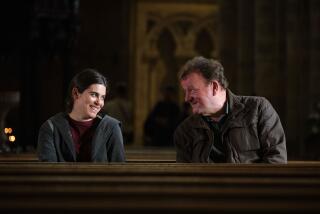‘To Heaven by Water’ gets the British scene just right
Justin Cartwright was born in South Africa in 1945, came to study at Oxford in the mid-1960s and has lived in England ever since. Like his previous novels, “To Heaven by Water” showcases his uncanny ability to get the British scene just right, combining the perspective of a onetime outsider with the innate knowledge of one thoroughly at home.
The novel is a snapshot of a particular time in London -- the present -- and will serve very well one day as a time capsule of this interregnum. This is British society post-Iraq, post the prosperity and exorbitant property prices that characterized the early years of the 21st century. It’s a time of bewilderment, of anger, of bitterness -- what went wrong? Even despised old Tony Blair is looking good in a world where his successor seems to be nothing more than a punching bag for everyone, including retired TV anchorman David Cross, the novel’s protagonist:
“There’s a capacious, unused look to Gordon Brown, like an old rectory with too many rooms. God knows what he looks like without his clothes on: he’s way too fat, unlike Blair who keeps himself pretty trim. More and more the role of the politicians is to provide the people with an excuse to air their own banal and inaccurate opinions. Politicians’ lives only have meaning in relation to how they are perceived; in fact Berkeley’s saying, To be is to be perceived, seems to have been stood on its head.”
That’s the thing about Cartwright: He’ll always surprise, transporting the reader from quotidian preoccupations of today’s London to the subjective idealism of a great 18th century philosopher.
Indeed, in the world of this novel, there are all sorts of crosscurrents. Nothing is quite what it seems. Recently widowed and thought to be grieving, David is not particularly bereft. Glad to be liberated from a marriage that was marred by secrets and betrayals on both sides, and from the 24-hour news culture in which he felt like a fish out of water, David is searching for some sort of meaning in his past and his present alike. And the future? At the moment, he is working out frenetically in the gym, losing so much weight that everyone assumes he is ill, and taking each day as it comes.
What he finds in London when out of the swim are more of the disloyalties and disappointments that characterized the life he led on the edges of celebrity. Discreditable actions on his part and that of others are sometimes casual, at other times so deliberate as to render them chilling. Anything must be better than this, so he goes to visit his dying brother, Guy, who has fled the ruin of his own life to embrace a different kind of existence in the Kalahari Desert in southern Africa. In a peripatetic, chaotic, picaresque journey that takes the brothers back and forth across actual political boundaries even as they cross existential barriers, David finds something of value in a world stripped to its essence.
Nature in the Kalahari is a pretty brutal scene, literally red in tooth and claw. Cartwright does not sugarcoat its reality. The terribleness of all this being preferable to a comfortable life in London brings home the tawdriness of that urban existence. To Guy in his world of venomous snakes and no-less-deadly elephants, “What does it matter . . . that his younger brother received the Royal Society of Television’s Gold award or that Gordon Brown will be forced from office or that the colours for next spring’s fashions, according to the experts, will see a return to the natural.”
But although brother Guy meets his fate by going back to nature, David has to return eventually to his own world, even though he has seen through all its vanities. A symbolic rite of passage near the book’s end highlights the consequences of his actions. He cannot escape, but David thinks, “Maybe this is the real presence, transcending the merely rational, that Guy was looking for,” and he opts for a more holistic approach to the life he has left.
Rubin is a critic and author of “Sarah Gertrude Millin: A South African Life.”
More to Read
The biggest entertainment stories
Get our big stories about Hollywood, film, television, music, arts, culture and more right in your inbox as soon as they publish.
You may occasionally receive promotional content from the Los Angeles Times.






